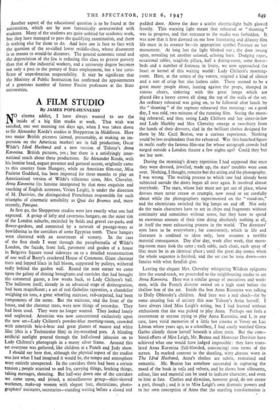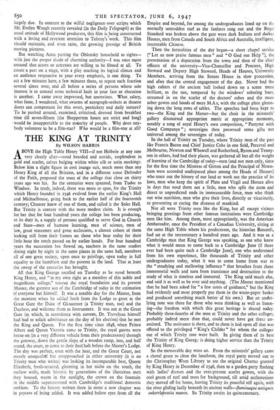A FILM STUDIO
By JAMES POPE-HENNESSY
NO cinema addict, I have always wanted to see the inside of a big film studio at work. That wish was satisfied, one wet morning ten days ago, when I was taken down to Sir Alexander Korda's studios at Shepperton in Middlesex. Here two major British pictures (aimed, presumably, at making an im- pression on the American market) are in full production, Oscar Wilde's Ideal Husband and a new version of Tolstoy's Anna Karenina. British pictures, yes ; but there is a satisfyingly inter- national touch about these productions. Sir Alexander Korda, with his leonine head, august presence and guttural accent, originally came to this country from Hungary, while an American film-star, Miss Paulette Goddard, has been imported for three months to play an Americanised version of Wilde's villainous siren, Mrs. Cheveley. Anna Karenina (its heroine interpreted by that most exquisite and touching of English actresses, Vivien Leigh), is under the direction of M. Duvivier, the distinguished Frenchman responsible for such triumphs of cinematic sensibility as Quai des Brumes and, more recently, Panique.
At first go, the Shepperton studios were just exactly what one had expected. A group of lofty and cavernous hangars, on the outer rim of the London suburbs, encircled by fields and gravel car-parks and
• flower-gardens, and connected by a network of passage-ways as bewildering as the corridors of some Egyptian tomb. These hangars were cluttered with an assortment of scenery. In the case of the first sheds I went through the paraphernalia of Wilde's London, the facade, front hall, pavement and garden of a house in Belgrave Square stood sideways on to a detailed reconstruction of one wall of Barry's crocketed House of Commons. Giant chestnut trees and lopped lilacs in full bloom, supported by pulleys, withered sadly behind the garden wall. Round the next corner we came upon the galaxy of shining broughams and curricles that had brought the coroneted guests, a few weeks back, to Lady Chiltern's ball. The ballroom itself, already in an advanced stage of disintegration, had been magnificent ; a set of real Gobelins tapestries, a chandelier weighing six tons, a great whorling staircase, red-carpeted, had been components of the scene. But the staircase, and the front of the house, and the chestnut trees, were now things of yesterday. They had been used. They were no longer wanted. They looked lonely and neglected. Attention was now concentrated exclusively upon the new set—Lady Chiltern's powder-blue morning-room, crowded with ninetyish bric-a-brac and great plumes of mauve and white lilac (this is a Technicolor film) in ivy-wreathed pots. A blinding artificial sunlight poured through the half-closed jalousies on to Lady Chiltern's photograph in a massy silver frame. Around this set everyone was gathered, like children at a Punch and Judy show.
I should say here that, although the physical aspect of the studios was just what I had imagined it would be, the tempo and atmosphere were entirely unexpected. In the corridors there had been a certain tension ; people scurried to and fro, carrying things, fetching things, taking messages, shouting. But half-way down one of the corridors we came upon, and joined, a miscellaneous group—shirt-sleeved workmen, make-up women with elegant hair, electricians, photo- graphers' assistants, secretaries—standing waiting before a closed and padded door. Above the door a scarlet electric-light bulb glowed frostily. This warning light meant that rehearsal or " shooting " was in progress, and that entrance to the studio was forbidden. It was now that it first dawned on me how frustrating and dilatory film life must in its essence be—its appropriate symbol Patience on her monument. At long last the light blinked out ; the door swung open, revealing yet another colossal, echoing barn. Dodging ropes, occasional tables, scagliola pillars, half a dining-room, some flower- beds and a number of footmen in livery, we now approached the heart or kernel of this waiting world: Lady Chiltern's morning- room. Here, at the centre of the vortex, reigned a kind of silence and a sort of crisp but also listless calm. There seemed to be a great many people about, leaning against the props, slumped in canvas chairs, tinkering with the great lamps which are placed like a heavy crown all along the top of the walls of the set. An ordinary rehearsal was going on, to be followed after lunch by the " shooting " of the segment rehearsed that morning : on a good day, I was told, two minutes of the running film. Seeing the morn- ing rehearsal, and then seeing Lady Chiltern and her sister-in-law and Lady Markby and Mrs. Cheveley emerge at two-thirty from the hands of their dressers, clad in the brilliant clothes designed for them by Mr. Cecil Beaton, was a curious experience. Nothing could be less resplendent than the rehearsal. Was this hunched figure in mufti really the famous film-star for whose autograph crowds had surged outside a London theatre a few nights ago? Could they but see her now.
During the morning's dreary repetition I had supposed that once they were dressed, jewelled, made up, the stars' troubles were soon over. Nothing, I thought, remains but the acting and the photography. I was wrong. The waiting process to which • one had already been subjected outside the doors began all over again. It involved almost everybody. The stars, whose hair must not get out of place, whose dresses must never crease or crumple, now stood or sat carefully about while the photographers experimented on the "stand-ins," and the electricians switched the big lamps on and off. Not only do the main characters have to act in chips and fragments without continuity and sometimes without sense, but they have to spend an enormous amount of their time doing absolutely nothing at all, in itself the most exhausting process in the world. The directors' eyes have to be everywhere ; for consistency, which in life and literature is confined to ideas only, here assumes a terrible material consequence. Day after day, week after week, that morn- ing-room must look the same ; each table, each chair, each spray of lilac must be in an identical place ; until the great day comes when the whole sequence is finished, and the set can be torn down—one fancies with what fiendish glee.
Leaving the elegant Mrs. Cheveley whispering Wildean epigrams into the sound-track, we proceeded to the neighbouring studio to see Anna Karenina. Here was a similar group of executives and work- men, with the French director seated on a high stool before the shallow box of the set. Inside the box Anna Karenina was talking to Dolly Oblonsky's children. And here was a real shock—for by some amazing feat of artistry this was Tolstoy's Anna herself. I have always liked Miss Leigh's acting, but I had learned without enthusiasm that she was picked to play Anna. Perhaps one feels a resentment at anyone trying to play Anna Karenina, and I, in any case, have vivid memories of a little hot cinema at Vevey on Lac Leman where years ago, as a schoolboy, I had sourly watched Greta Garbo silently throw herself beneath 'a silent train. But the com- bined efforts of Miss Leigh, Mr. Beaton and Monsieur Duvivier have achieved what one would have judged impossible : they have trans- lated Anna Karenina (full-blooded, convincing) into terms of the screen. In marked contrast to the dazzling, witty /Iresses worn in The Ideal Husband, Anna's clothes are subtle, restrained and romantic. Mr. Beaton has somehow succeeded in capturing the mood of the book in veils and velvets, and he shows how silhouette, colour, line and material can be used to indicate character, and even to hint at fate. Clothes and direction, however good, do not create a part, though ; and it is to Miss Leigh's own dramatic powers and to her own conception of Anna that the startling transformation is
largely due. In contrast to the wilful negligence over scripts which Mr. Evelyn Waugh recently revealed (in the Daily Telegraph) as the usual attitude of Hollywood producers, this film is being constructed with a loving and reverent attention to Tolstoy's work. This film should maintain, and even raise, the growing prestige of British moving pictures.
But watching Anna putting the Oblonsky household to rights— with just the proper shade of charming authority—I was once more amazed that actors or actresses are willing to be filmed at all. To create a part on a stage, with a play reaching its logical climax and an audience responsive to your every emphasis, is one thing. To act a few minutes here, a few minutes there, to repeat each fraction several times over, and all before a series of persons whose sole interest is to conceal some technical fault in your face or elocution is another. I came away impressed, but =envious. What, salary, what fame, I wondered, what swarms of autograph-seekers at theatre doors can compensate for this overt, pernickety and daily torture? To be pushed around, examined, criticised, dressed from breakfast time till seven-fifteen (the Shepperton hours are strict and long) - would be insupportable to the majority of people. Why does any- body volunteer to be a film-star? Who would be a film-star at all?



































 Previous page
Previous page